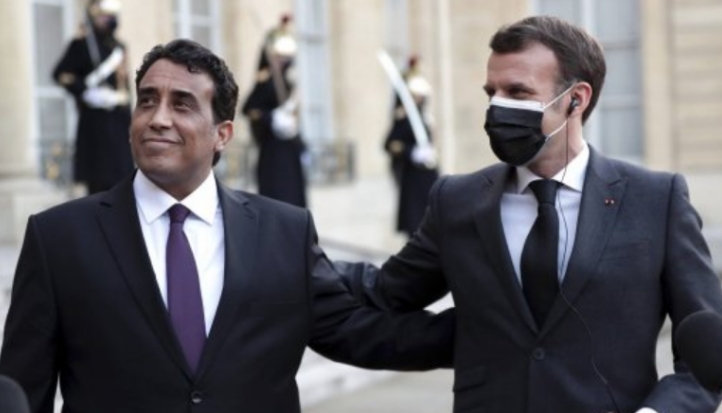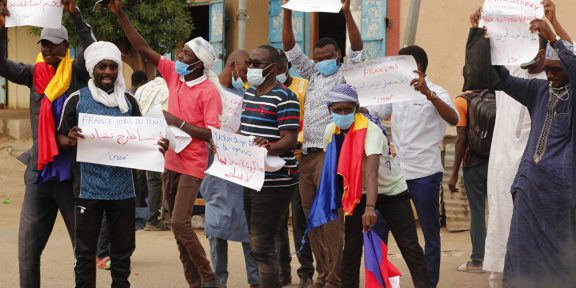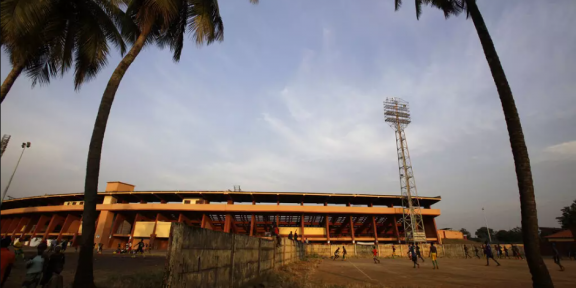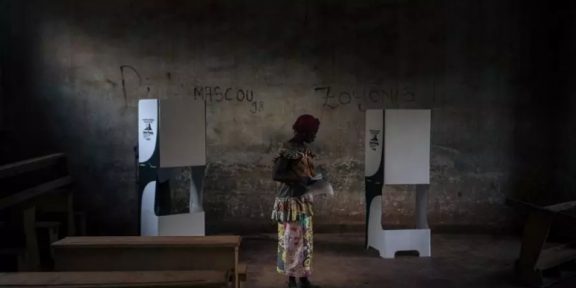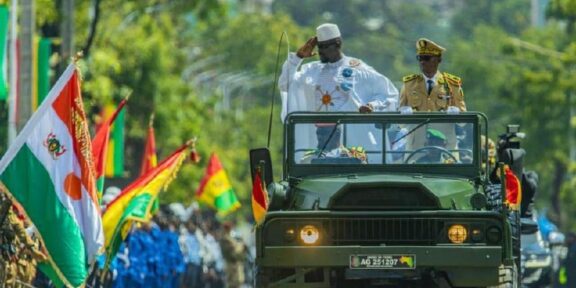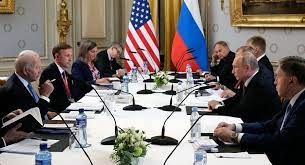French President Emmanuel Macron backs new Libyan transitional President Mohamed Al Menfi in a 23 March meeting in Paris, saying Turkish and Russian forces should leave the country. France sees instability in the Sahel and migration as linked to the Libyan crisis, and wants December’s elections to bring peace to the country.
There was no grand reception or big announcements in the media. Libya’s President Al Menfi met French President Emmanuel Macron at the gates of the Élysée Palace, accompanied by Moussa Al Koni, one of his vice-presidents and Fezan’s representative.
The French president spoke for 45 minutes to his Libyan counterpart, whom he had invited following his surprise election on 5 February. From 6 February, Menfi’s advisers have been trying to establish contacts within the Élysée and the Quai d’Orsay. On 7 February, Macron and the new Libyan president, who is also a French speaker, had a phone conversation.
This is Menfi’s first foreign trip since taking office.
On 23 March, Macron discussed with his counterpart the way out of the Libyan crisis, with elections are scheduled for December. The two men also discussed issues related to the fight against terrorism and external interference in Libya.
“The Turkish and Russian foreign forces as well as the foreign fighters who have been imported by them or by others to Libyan soil, must leave as soon as possible, because it is up to the Libyan armed forces reunited under your authority to secure Libya,” said the French president at the end of the meeting.
Paris feels that insecurity in the Sahel, where French troops are stationed, is largely linked to the instability that Libya has been experiencing since 2011.
Fighting against trafficking
“There will be no peace in the central and eastern Mediterranean, in the Sahel and in this whole region of Africa if we do not manage to have peace and stability in Libya and if we do not manage to eradicate the terrorist groups and traffickers of all kinds who are destabilising Libya and the whole region,” said Macron. On the economic side, Paris is also waiting for the go-ahead from Tripoli to renew the Défense Conseil International’s contract, which is supposed to deliver equipment to the Libyan army.
Very involved in the Libyan issue since the beginning of his presidential term, Macron had not managed to complete the mediation between Fayez al-Sarraj and Khalifa Haftar in 2018. Paris had, without success, insisted that elections be held in December 2018. In April 2019, Haftar launched his offensive on Tripoli, which ended in the summer of 2020 with the defeat of his troops.
Macron also discussed the continuation of the political process in Libya with Menfi. “The priority will be to maintain the ceasefire, the unity of all political forces and Libyan components to reach the electoral deadline at the end of the year. Then, achieve the unification and professionalisation of the Libyan armed forces in the service of the transition and democracy. And finally, to carry out the unification of all the economic and financial structures.”
Macron also announced that the French embassy in Tripoli will reopen on 29 March.
A timid renewal of relations
Menfi’s visit to the Élysée Palace marks a timid renewal of relations with the Libyan government. Koni’s presence – rather than that of Vice President Abdullah Al-Lafi, who represents Tripolitania – could facilitate dialogue with Paris, as Koni is well versed in French diplomacy.
Until now, relations with the previous Government of National Accord had been icy because of France’s unofficial support of Haftar. In the race to elect the new reunified government, Paris had bet on Menfi’s competitors: Aguila Saleh, the speaker of the House of Representatives, and Fathi Bachagha, the former minister of the interior.
Stopovers abroad
Introduced on 16 March in Tripoli, in the presence of his predecessor Fayez al-Sarraj, Menfi embarked on a diplomatic tour. He received Tunisia’s President Kaïs Saïed, who was anxious to revive bilateral economic relations on 17 March in Tripoli. This was a symbolic meeting, as the last Tunisian visit had been in 2012.
Menfi is also expected in Ankara, where Turkish President Recep Tayyip Erdogan has invited him. Turkey, the new Government of National Unity’s main ally, is working hard to get the maximum out of Libyan markets, at a time of announced reconstruction.
Source: The Africa Report

